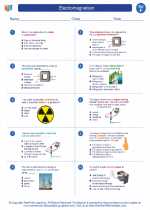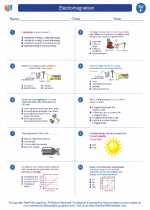Systems in Science
In science, a system refers to a group of interacting, interrelated, or interdependent components forming a complex whole. Systems can be found in all areas of science and can range from the smallest biological cells to the largest celestial bodies in the universe. Understanding systems is crucial in science as it allows us to study and explain the behavior and interactions of various phenomena.
Types of Systems
There are several types of systems in science, including:
- Open Systems: These systems can exchange both matter and energy with their surroundings. Examples include a boiling pot of water or a living organism.
- Closed Systems: These systems can exchange energy but not matter with their surroundings. A sealed terrarium is an example of a closed system.
- Isolated Systems: These systems exchange neither matter nor energy with their surroundings. While true isolated systems are rare, the universe as a whole is often considered an isolated system.
Characteristics of Systems
Systems have several key characteristics, including:
- Components: The parts or elements that make up the system.
- Interactions: The ways in which the components of the system act on and influence each other.
- Boundaries: The limits or borders that define the system and separate it from its surroundings.
- Inputs and Outputs: The materials, energy, or information that enter and leave the system.
- Feedback: The process by which a system responds to changes in its environment or within the system itself.
Studying Systems
When studying systems, scientists often use systems thinking to analyze the interactions and behaviors of the components within a system. This involves considering the system as a whole and understanding how changes to one part can affect the entire system.
Key concepts in studying systems include:
- Emergent Properties: The unique properties or behaviors that arise from the interactions of the components within a system.
- Equilibrium: The state in which the system remains stable and balanced, often through the balancing of inputs and outputs.
- Feedback Loops: The mechanisms by which a system can self-regulate and maintain stability through feedback from its components.
Study Guide: Understanding Systems
To understand systems in science, consider the following questions and concepts:
- What are the components of the system you are studying? Identify the individual parts and their roles within the system.
- How do the components of the system interact with each other? Consider the ways in which they influence each other's behaviors and properties.
- What are the boundaries of the system? Define the limits of the system and consider how they separate it from its surroundings.
- What inputs and outputs are involved in the system? Explore the materials, energy, or information that enter and leave the system.
- How does the system respond to changes in its environment? Consider the feedback mechanisms and how the system maintains stability or adapts to changes.
- What emergent properties arise from the interactions of the components? Identify any unique behaviors or properties that result from the system as a whole.
By considering these questions and concepts, you can develop a deeper understanding of systems in science and their significance in explaining natural phenomena.
.◂Science Worksheets and Study Guides Sixth Grade. Electromagnetism

 Activity Lesson
Activity Lesson
 Worksheet/Answer key
Worksheet/Answer key
 Worksheet/Answer key
Worksheet/Answer key
 Worksheet/Answer key
Worksheet/Answer key
 Vocabulary/Answer key
Vocabulary/Answer key
 Vocabulary/Answer key
Vocabulary/Answer key
